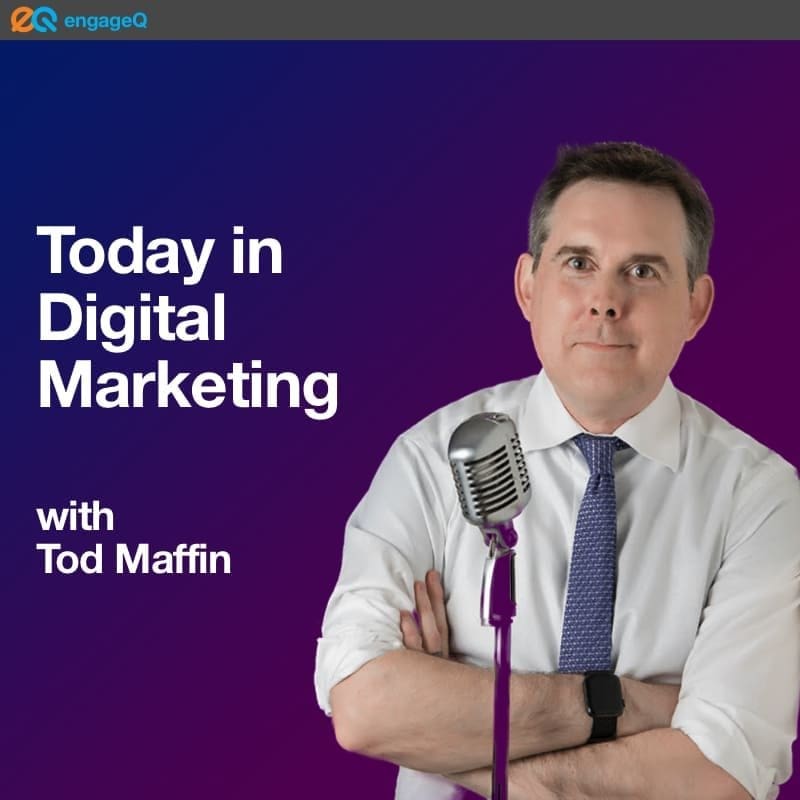Damage Done.
Now that Google has confirmed the leaked SEO documents are real, can marketers ever take them at their word again?
by Tod Maffin (email • LinkedIn • social media)
Today's News
GOOGLE • Confirms Leaked API Docs Are Real
FACEBOOK • Tabloid Gossip is the Most Shared
ADS • Google Ads Being Mixed Into Organic Results
GOOGLE • Shutting Down “Business Messaging”
INSTAGRAM • Easier to Ignore Everyone But BFFs
OOPS • Google Deletes All of Customer’s Files
GOOGLE • Confirms Leaked API Docs Are Real
After silence for two days, Google has confirmed that a massive trove of leaked confidential search documents are real.
The leak contained 2,500 pages of internal API documentation — some of which seemed to be counter to advice it had publicly given marketers about how to rank higher.
Rand Fishkin, the SEO veteran who first published the leaked documents, told Gizmodo:
What can we believe now?
Most industry people understood that Google reps had to be somewhat vague about the specifics of what makes a page rank higher. But what bothered many people in the SEO space this week was that the leaked documents revealed ranking levers that Google reps in the past have said didn’t matter at all.
One of those elements is called smallPersonalSite . The documentation doesn’t reveal the weighting behind a site given that label, so we don’t know if Google gives such sites a penalty or a boost, and by how much — but this is a good example of a lever Google has said in the past it doesn’t factor into how a site ranks.
Google’s warning: Don’t make ‘assumptions’
As I mentioned, Google confirmed that the documents were real, but said:
Of course Google didn’t share which parts of those documents were out-of-context, outdated, or incomplete.
What now for Google’s reputation?
The timing of all this, of course, couldn’t have been worse for Google.
It came as the company aggressively rolled out its AI summaries for search queries — a product that pretty much everyone except Google says is not ready for prime time.
On the consumer side, it’s giving out ridiculously inaccurate advice like adding glue to pizza, and seemingly being unable to distinguish authentic content from satire sites like The Onion or shitposts found on Reddit.
For marketers, it’s almost worse — the next evolution of Google’s zero-click strategy: Giving users answers while downplaying links to web pages and stores. Links that marketers rely on to drive traffic and build business.
One thing is clear: this leak, and now Google’s response to it, have not helped the company during one of its most pivotal times.
🎁 Everyone who guesses will be entered in our monthly draw for a full year of our Premium Newsletter free!
FACEBOOK • Tabloid Gossip is the Most Shared
Facebook has released its quarterly report on what content got traction on its platform.
Facebook started doing these reports to counter a widely held belief that its algorithm pushes people toward controversial, emotionally charged, divisive content.
This report looked at this past Q4.
Or, at least it almost did — the report somewhat hilariously redacts four of the top six videos that went viral. The content doesn’t appear to have been redacted for this report; rather, that line item reads “This video is temporarily unavailable,” which implies it was pulled because of policy violations.
This means we don’t know what the #1, #3, #4, and #6 videos were. We do know that they each had more than 43 million views before being pulled. Whatever the top video for the quarter was hit more than 50 million before being smacked.
In terms of the web sites most often linked to, the top five are:
A GIF search engine
Goodbye politics; hello tabloid gossip
If People being in there surprised you, it surprised me too — turns out the content that people are sharing and Facebook’s algorithm is pushing has turned mostly to Hollywood gossip.
The top three posts were:
Matthew Perry’s death
Jeff Bezos moving to Miami
Martha Stewart’s fashion
And almost all the rest of the top 10 were “similarly tabloidy”:
What marketers should know
As for the marketing industry, one important takeaway is that the shift away from links continues.
We’ve known for some time that Facebook’s algo doesn’t like to reward posts which take people off its site, and as the years go on, this only seems to be more pronounced.
Fewer than 5% of posts shown to users in their News Feed included a link in last year’s Q4.
Looking back to Q3 2021, that number was 13.5% — still low, but much more than these days.
You can probably see this trend in your web site traffic reports, with visitors from Facebook in steady decline.
What the report doesn’t show
There is one big caveat to these reports, through — Facebook only reports what is shown on feeds.
It does not include those shared between individuals via DM and, notably, doesn’t include those shown in groups. I would argue that some of the more divisive content is being shared via those methods, so it’s not as transparent a report as Meta would have us believe.
ADS • Google Ads Being Mixed Into Organic Results
A year-long Google experiment that tested placing ads amongst organic results has ended, and the results must have been good, because that experiment has now become canon.
Two months ago, the company changed its documentation about Top Ads to read:
This isn’t, of course, where consumers expect ads to be — we’re all trained that we can safely ignore the top few results — and we can assume that’s precisely why Google wants to shake things up.
How we got here
We first saw this in light testing last June. Then mid-October, that test group got much wider and people started noticing:
More sneaky ad placements from Google. For the past few months we have seen a single ad being placed in the middle of SERPs on mobile as a test. Now I’m seeing two in a row right in the middle. At least they’re not still putting ads at the top – that would be intense.
— SERP Alert (@SERPalerts)
Oct 23, 2023
Two months ago, Google’s ad liaison confirmed they’d made the change permanent.
So, with two months under our belt, Brodie Clark writing for Search Engine Journal has run some numbers and given us a better sense of it all.
What it looks like in the real world
He says most commonly it’s a unit of one or two ads that are placed within the top organic results — ads that normally would have been placed at the top.
He says the most common layout is to place these ads directly below a featured snippet, rather than above, as had been in the past.
It’s probably not a huge deal
This isn’t anything to freak out about, though — even though ads can now appear intermingled, Clark says it still doesn’t happen very often and it’s almost as if Google is still treating it like a test.
GOOGLE • Shutting Down “Business Messaging”
Google is shutting down its Business Messaging service, an instant messaging client built into Google Maps. This feature allowed users to chat with businesses directly from their Google Maps or Google Search results.
The “Chat” button on a business's place card in Google Maps will be disabled on July 15. By July 31, the service will be completely shut down.
History of the service
The service was launched in 2017, with the awkward name “Google My Business Chat.” It was originally integrated with SMS.
In 2018, the company made it a standalone service within the Maps app, eliminating the need for third-party apps. Businesses used this feature for customer service, and Google created an API for large businesses to manage customer messages.
What now?
If you need chat data out of it for compliance or regulatory reasons, you’ll be able to download past chat conversations using Google Takeout.
Google says it does not plan to replace the service, advising businesses to use alternative communication channels.
It’s a strange decision, for sure — especially given that two of its biggest competitors — Apple and Meta both offer business messaging solutions.
INSTAGRAM • Easier to Ignore Everyone But BFFs
Instagram will now let you mute incoming messages from everyone except users on your close friends list.
This, of course, a consumer feature in the app — it’s nothing I expect businesses would want to do.
“Fancy putting ‘No Riff-Raff!’”
When you enable limits for everyone but close friends, you’ll only see DMs, tags, and mentions from those on your close friends list. Others can still interact with your posts, but you won't see these updates.
Sadly, for the anti-social among us, that setting will automatically turn off after four weeks, and you’ll need to manually extend it.
Also, the app has expanded its Restrict feature and now lets you prevent a specific user from tagging or mentioning you, in addition to hiding their comments.
OOPS • Google Deletes All of Customer’s Files
You think you’re having a bad month?
At least you’re not the Google employee who accidentally deleted all of the data of one of its customers.
That customer is a $135 billion Australian pension fund. They use Google Cloud to store their data, and one day woke up to discover everything they’d put there was gone.
But no problem, at least there were backups too, right? Nope. Google had deleted those as well.
Luckily, they did have the whole thing mirrored in a completely separate geographical region — unluckily, Google deleted that mirror too!
This caused two weeks of downtime and deep concerns from the hundreds of thousands of members wondering what happened with their retirement savings.
A very apologetic joint statement from the Google Cloud CEO and the pension fund’s CEO followed, then, some soul searching.
This week, Google posted a report on what happened and, it turns out, someone forgot to fill in a field.
And if you’re thinking — surely, there must be some kind of notification or confirmation screen or “Hey are you sure you want to do that” pop-up box before big things like that happen, Google says there are, but those only appear for consumer-facing controls. Google employees don’t get any confirmations.
The pension fund says they’ve reconstructed most of their data now, thanks to a third-party failsafe backup provider they’d been using, though they didn’t say how up to date that backup to the backup was.
Google says the issue only happened with that one customer, and they’ve made some changes and totally checked everything so it shouldn’t ever happen again.
Really. Pinky swear.
– 30 –
Generate more repeat purchases with Black Crow AI
Black Crow AI helps merchants recognize 100% of returning users and predicts shopping behavior patterns so you can effortlessly acquire more sales.
Their Shopify app plugs into your tech stack with zero development work required. And everything is set up for you to see clear incremental revenue so you can judge the value for yourself during a 30-day free trial.
Their team is so confident you’ll see 5-8X ROI that they’re offering a $100 Amazon gift card to Shopify brands with $2M+ in annual revenue just to get a demo.
Upgrade Your Media Buying Skills:¹
Google Ads for Beginners
Inside Google Ads: Advanced
Foxwell Founders Community
Foxwell Digital Courses
Tools We Use and Recommend:¹
Marketing tools: Appsumo
Podcast recording: Riverside
Email newsletter: Beehiiv
Refer Us and Get Free Stuff! 🎁
1 referral = Tod’s How to Go Viral keynote 🗣️
5 referrals = Shout-Out on the Podcast 🎙️
20 referrals = Free Ad in the Newsletter 📰
{{rp_personalized_text}}
Copy and share ⇨ this link ⇦
¹ Some links provide affiliate revenue














